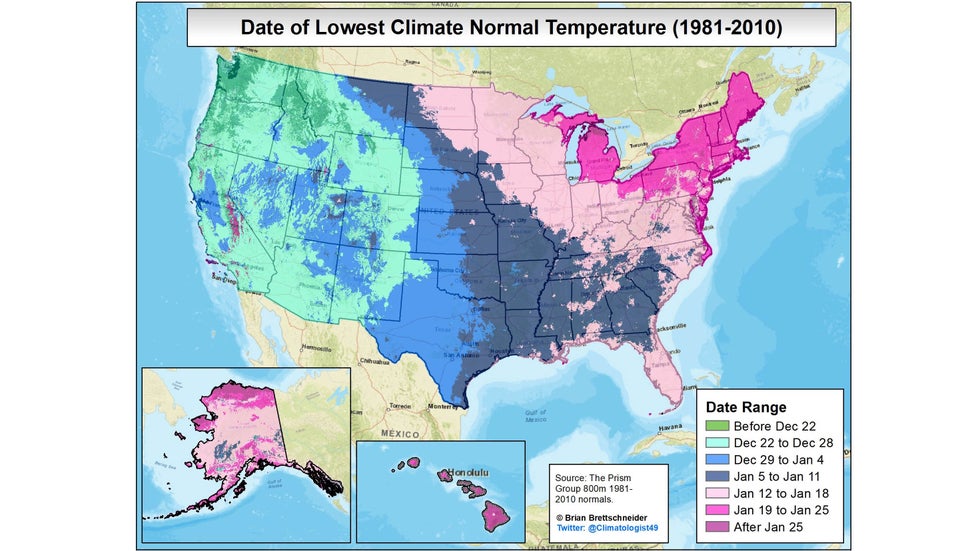With the winter solstice on Dec. 21, the official start of winter is less than two weeks away, but for most of the United States, the average coldest time of the year isn't until after that.
Dr. Brian Brettschneider, a climatologist at the University of Alaska Fairbanks, compiled the map below, which illustrates the date when average temperatures – based on the 30-year period from 1981 to 2010 – plunge to their lowest values of the year.
On average, portions of the Northwest reach their coldest time of the year around the winter solstice or earlier.
For example, in Portland, Oregon, November and December are the two wettest months, yielding increased cloud coverage and, therefore, colder temperatures due to the lack of sunshine. As a result, December is the coldest month in Portland.
But much of the rest of the U.S. doesn't reach the coldest time of the year until after the solstice – or several weeks after it, in some cases.

While the sun is lowest in the sky, delivering its most direct radiation over the Southern Hemisphere, at the winter solstice, it takes multiple days or weeks to cool down the Earth's surface in order to make appreciable changes, and then for the air above it to cool. For that reason, there's a seasonal lag between the solstice and the typical coldest time of the year.
This is similar to how the warmest time of the year occurs after the summer solstice across much of the U.S.
For many areas from California into the Great Basin and Rockies, the coldest time of the year climatologically is between Dec. 22 and 28.
Farther east, in the central and southern High Plains, Dec. 29 to Jan. 4 is when average temperatures bottom out.
Other parts of the Plains and into the lower and mid-Mississippi Valley and parts of the South reach their coldest point between Jan. 5 and 11.
The upper Midwest, Ohio Valley, mid-Atlantic and much of Florida shiver in the coldest temperatures, on average, between Jan. 12 and 18.
In the Northeast and Great Lakes, Jan. 19 to 25 is when most locations plunge to their coldest. Northern Lower Michigan is the last area in the Lower 48 to reach the year's coldest average temperature, not occurring until after Jan. 25 in a typical winter.
The Weather Company’s primary journalistic mission is to report on breaking weather news, the environment and the importance of science to our lives. This story does not necessarily represent the position of our parent company, IBM.
The Weather Company’s primary journalistic mission is to report on breaking weather news, the environment and the importance of science to our lives. This story does not necessarily represent the position of our parent company, IBM.

No comments:
Post a Comment